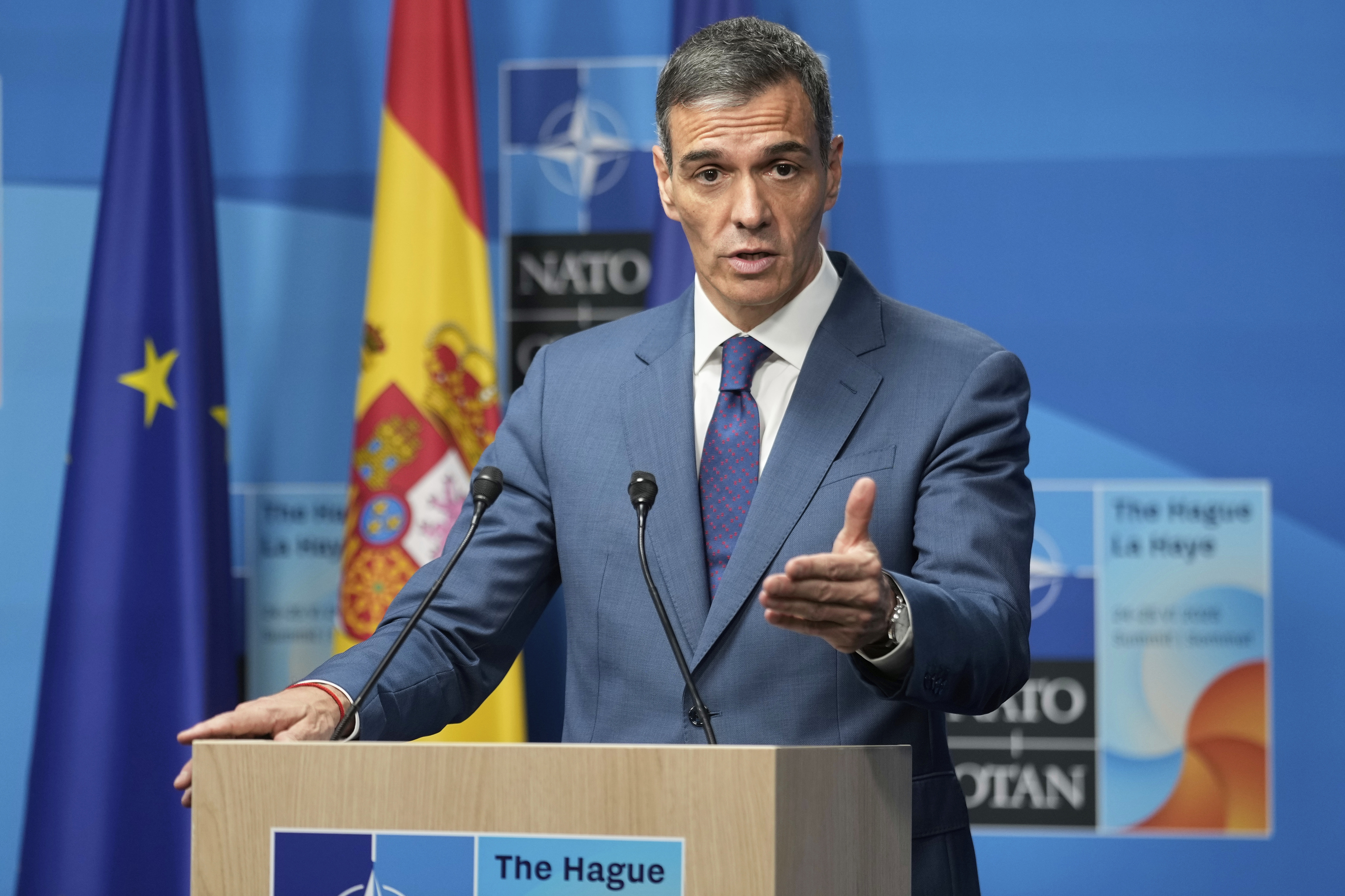The water rose to levels that endangered breathing. The alleged corrupt scheme within the PSOE and the Government described by the COU (Central Operative Unit) of the Civil Guard raised the pressure, leading governance partners to grab lifeboats. However, the NATO summit and the debate on military spending allowed Pedro Sánchez to find a lifeline to breathe oxygen. His refusal to commit to spending 5% of GDP on Defense and positioning himself as resistance or antithesis to Donald Trump has allowed him to navigate a significant challenge among his allies (parliamentarians). But this lifebuoy has triggered a storm in the form of a threat of a tariff war from the U.S., where the Government's strategy now focuses on avoiding a clash with Trump. The directive now is to not contribute to escalation.
"Facing Trump's constant threats, the commitment is clear: we consider any increase in military spending a mistake and contrary to what the citizens want." The statement is signed by Mertxe Aizpurua, parliamentary spokesperson for EH Bildu, one of Sánchez's most stable partners. "It has always been a good thing to anger Trump, always been a good thing to anger a neoliberal fascist," summarized Gabriel Rufián, spokesperson for ERC. The clash strategy has served as cement to try to cover some of the cracks between La Moncloa and the parties that support the PSOE. And this key is crucial in everything that has happened. But Trump's threat always stirs up the sea that the head of the Government intends to navigate.
La Moncloa reaffirms its position and stance of not spending more than 2% of GDP on Defense, citing the "flexibility" agreed with Mark Rutte, NATO Secretary General, to have its own spending path. "We agreed on a disagreement," he said on Wednesday in The Hague. But the directive in this scenario of threat of tariffs on Spanish products is clear: "We are not going to quarrel with Trump," government sources indicate. The staging involves seeking refuge in Brussels, appealing that it is not about Spain, but about the European Union, which is a common market with the European Commission as the spearhead for negotiating and defending the countries.
"We will not engage in a clash with the U.S.," is the position and directive. And it translates into a deployment of statements from Government members, starting with Sánchez himself. "Spain is a sovereign country, a friend of its friends, and we consider the U.S. friends of Spain. What we want is to build bridges, not break any," he said from Brussels, where he participated in the European Council.
"Beyond the rhetoric used by Mr. Trump, which, on the other hand, surprises practically no one, what we need to focus on are the facts, and what Spain and this Government have shown is that we are a serious and reliable partner," argued Pilar Alegría, Government spokesperson. "We need to deepen the seriousness and predictability of Spain as an economy, and the seriousness of the European model," emphasized the Minister of Industry and Tourism, Jordi Hereu.
The Minister of Defense, Margarita Robles, showed more firmness and a tougher stance, but the message's essence remains the same: "No one should tell Spain what to do. Spain is a serious, reliable, committed, and responsible ally, who speaks less and delivers more."
"Our intention is not to offend," say government sources, insisting that the decision not to spend more than 2% of GDP on Defense "is a commitment entirely compatible with sustaining and strengthening the welfare state." This damage control effort aims to salvage the situation with the world's leading economic power and diplomatic relations, at a delicate moment. Although there has never been a connection with the Trump Administration, whom Sánchez has even described as "one of the references of the international far-right," it is still argued that the diplomatic relationship with the United States is "absolutely fluid."
Faced with Trump's threat, the Government explains that they have prepared scenarios for a possible trade war, with tools to act from a national perspective, although their hope is to find shelter in Europe and for Brussels to react as the representative of the interests of the 27 EU members. The Government avoids specifying what these mechanisms would be. They recall that in early April, they launched a Response and Commercial Relaunch Plan of 14.1 billion to "mitigate" the impact of U.S. tariffs.
The Minister of Economy, Carlos Cuerpo, who already traveled to the U.S. amid tensions due to our country's closeness to China, said yesterday from New York that "Spain will defend its entrepreneurs regardless of the scenario." "I do not want to speculate on hypothetical scenarios, but I do want to send a very clear message to our companies and producers in all sectors: Spain, bilaterally and through the EU, will be there to defend their interests. Regardless of the future scenario," Efe reports. Business sources contacted by EL MUNDO indicated yesterday that the Government had not yet contacted them.
